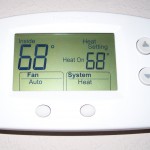Winter definitely is here! Thankfully, we are not shoveling snow here in the Panhandle like our neighbors to the north, but our electric bills most likely have risen as the mercury has dropped. To save money on your winter heating bill, follow these tips:
- Set thermostats no higher than 68ºF when people are home.
- Lower the thermostat when you sleep or are away from home. The Energy.gov website states that if the setback period is 8 hours or longer, savings of as much as 1% for every degree setback can be achieved.
- Put on a sweater or warmer clothing for comfort and lower the thermostat even more. Layer clothing. Closed or tighter cuffs and collars help to retain body heat. An extra blanket or throw will keep you toasty with a lower thermostat setting.
- Use ceiling fans to circulate heated air. Most fans have a switch that allows users to adjust the direction of the fan blade movement. Set fans to move in a CLOCKWISE direction in winter. The upward air flow will move stagnant hot air off the ceiling area and down into the living space. This allows for a lower temperature setting on your heating unit without a reduction in the comfort level.
- To ensure the heat gets to where it is supposed to go, use mastic or foil-faced tape to seal the seams and any cracks in air handling ducts.
- Have the heating system serviced each year to ensure efficient operation.
- Check caulking and weather stripping around doors and windows. Replace as needed to reduce heat loss.
- Clean or replace heating system filters. Dirty filters reduce the efficiency of the heating system and waste valuable fuel. Check filters monthly and clean or replace as directed by the manufacturer.
- Do not place furniture and curtains over or around the heat registers or in front of cold air returns. These items will block the airflow.
- Never use the stove for additional heat. It is dangerous. Besides causing a fire hazard, fumes given off by combustion from gas appliances can result in increased carbon monoxide levels.
- On sunny days, open blinds, shades, and curtains, especially if your windows face south. At sunset, close the blinds, shades, and curtains to help keep heat in your home. This really makes a difference.
For more household energy saving tips, visit the UF/IFAS Energy Efficient Homes series.
Source: No to Low Cost Actions to Save Home Energy and Money
Latest posts by Judy Corbus (see all)
- Check Your Coverage While the Sun is Shining - July 3, 2025
- Clean Up with Homemade Cleaners - April 28, 2025
- 5 Ways to Cool Your Power Bill - August 28, 2024

